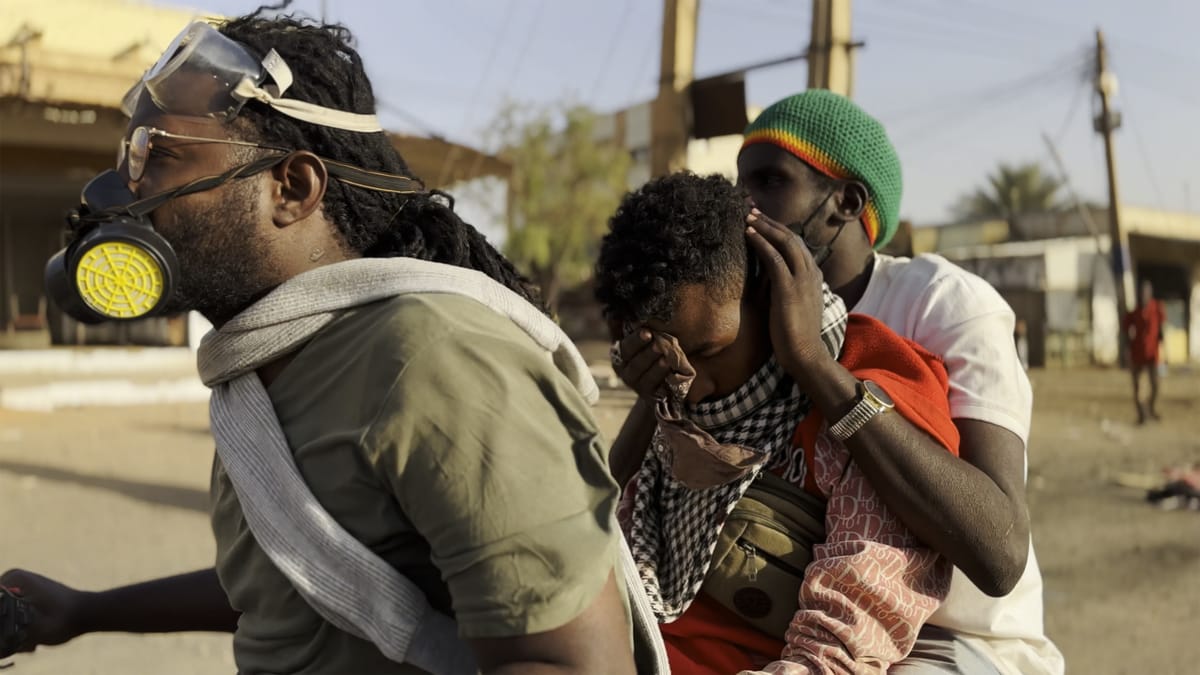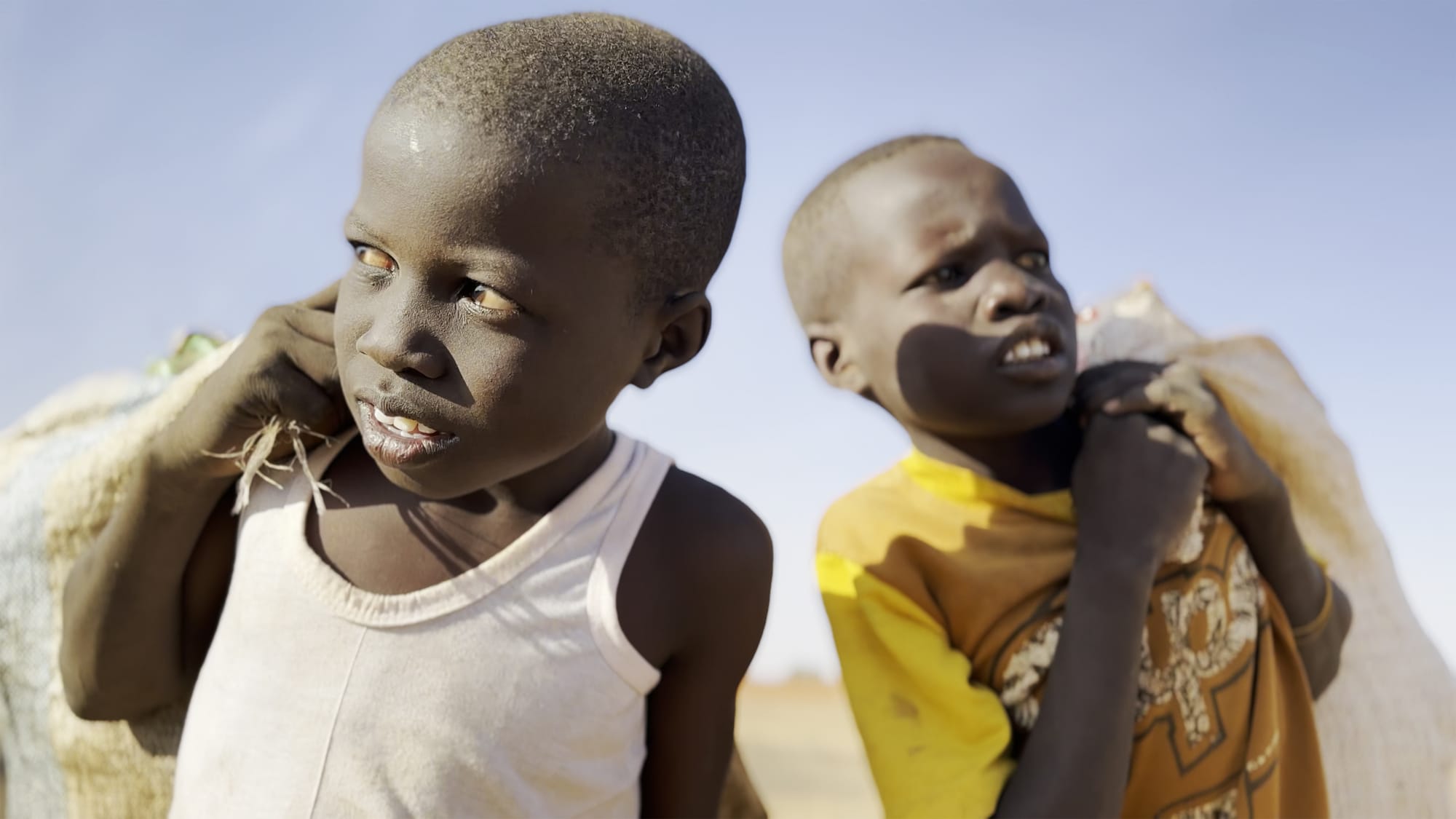🇬🇧🇸🇩When home can only be in the mind, it's time for Green Screen: Khartoum (Documentary Review) | BFI LFF 2025 (English with Arabic Translation)
With humour, unpretentiousness and deep care, five brave Sudanese icons recount their brave escape from the Civil War, and green screen helps visualise the Khartoum they were forced to leave behind.

Full disclosure: I am of Sudanese origin, and not at all impartial to this topic!, so this may be a personal one.
Two anecdotes seem relevant to start with – my mother has always instilled pride in me for my Sudanese roots. They go down the family tree on both sides, strongly, and that is something my mother made sure to elevate while growing up in England, away from the Diaspora. Within this pride was the pride of a people who would not stand for injustice or oppression - who were masters at peaceful overthrow of tyrannical governments, and had suffered great loss to fight to be free.
The second anecdote is my mother made no apologies for how racist Sudanese society had the capacity to be. She explained to me that to be Sudanese is to be African and Arab, to be proudly both.
Khartoum does not shy away from utilising it's free speech to unbound and unburden the conversation around Sudanese sovereignty and culture – a culture that risks dispersion to the winds once again, enabled by international actors seeking to destabilise the country. It does not avoid the tough conversations around violence, national identity, racism, and the instability of our governmental structures. The film brings levity and humanity to an otherwise incredibly bleak situation.
Five richly told stories of bravery and passion for Khartoum and Sudan play out across real footage and green-screen reconstruction, bringing to live both the beauty of the country, and the horror of the outbreak of Civil War.
At this very moment, there is Famine in Sudan affecting 24Million people, over half the population – and 13 million Sudanese have been displaced. Much like Gaza, this is man-made, by both military sides of the war, and it's the people of Sudan that suffer the cost.
When you ask a search engine about Sudan, it will tell you we have more pyramids than Egypt. It won't tell you Sudan is a country of peaceful protest, poetry and dance – artists and engineers, academics and street vendors, filmmakers and aspiring Hollywood stars (!) - regular people put into extreme circumstances, and yet their stories, their survival, is being largely ignored.
Free Sudan, or rather; to the tyrants of the world – let Sudan free itself.

Translation by Hayder Ahmed Omer
عندما يصبح الوطن مجرد فكرة في الذهن، فقد حان وقت فيلم «الشاشة الخضراء: الخرطوم» (مراجعة وثائقية) | مهرجان BFI السينمائي لندن 2025
بروح من الفكاهة والتواضع والاهتمام العميق، يروي خمسة من رموز السودان قصصهم عن الهروب الشجاع من الحرب الأهلية، بينما تساعد الشاشة الخضراء في تجسيد صورة الخرطوم التي اضطروا لتركها خلفهم.
إفصاح كامل: أنا من أصل سوداني، ولست محايدةً تجاه هذا الموضوع إطلاقًا! لذا فهذه المراجعة شخصية إلى حد ما.
يبدو أن هناك قصتين تستحقان أن أبدأ بهما — أمي غرست فيّ دائماً شعور الفخر بجذوري السودانية. جذورنا تمتد بعمق في شجرة العائلة من الجانبين، وقد حرصت أمي على تنمية هذا الفخر وأنا أترعرع في إنجلترا، بعيدًا عن الشتات. كان ضمن هذا الفخر، فخر بشعب لا يقبل الظلم أو القهر — شعب أتقن إسقاط الأنظمة المستبدة سلميًا، وقدّم تضحيات عظيمة في سبيل الحرية.
أما القصة الثانية، فهي أن أمي لم تُخفِ عني حقيقة أن المجتمع السوداني يمكن أن يحمل في داخله نزعات عنصرية. شرحت لي أن كونك سودانياً يعني أن تكون إفريقياً وعربياً معاً — أن تفخر بانتمائك لكليهما دون تناقض.
لا يتردد فيلم الخرطوم في استخدام حرية التعبير لفك القيود عن النقاش المتعلق بالسيادة والثقافة السودانية — ثقافة تواجه خطر التشتت مرة أخرى، بسبب تدخل قوى دولية تسعى لزعزعة استقرار البلاد. كما لا يتهرب الفيلم من مناقشة القضايا الصعبة: العنف و الهوية الوطنية و العنصرية وعدم استقرار مؤسسات الحكم. بل يضفي على هذا الواقع القاتم لمسة من الإنسانية والروح.
خمسة قصص مليئة بالشجاعة والعشق للخرطوم والسودان تُروى بتفاصيل غنية، عبر لقطات حقيقية وإعادة تمثيل باستخدام الشاشة الخضراء، فتُحيي جمال البلاد من جهة، ورعب اندلاع الحرب الأهلية من جهة أخرى.
في هذه اللحظة بالذات، يعيش السودان مجاعة تؤثر على 24 مليون شخص — أكثر من نصف عدد السكان — كما تم تهجير 13 مليون سوداني من ديارهم. ومثلما يحدث في غزة، فهذه الكارثة من صنع البشر، يتحمل مسؤوليتها طرفا الصراع العسكري، بينما يدفع الشعب السوداني الثمن.
عندما تسأل محرك بحث عن السودان، سيخبرك أننا نملك أهرامات أكثر من مصر. لكنه لن يخبرك أن السودان بلد الاحتجاج السلمي، والشعر، والرقص — بلد الفنّانين والمهندسين، الأكاديميين وباعة الشوارع، المخرجين السينمائيين والنجوم الطامحين لهوليوود (!) — أناس عاديون وُضعوا في ظروف قاسية، ومع ذلك تُتجاهل قصصهم وصمودهم إلى حدٍ كبير.
حرروا السودان — أو بالأحرى، إلى طغاة العالم: دعوا السودان يحرر نفسه.



